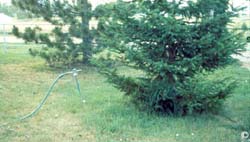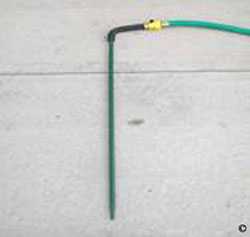In much of Colorado, winters can have extended warm, dry, windy spells. Warm winters without snow appeal to people, but cause winter drought.
What plants are at risk during dry winters?
Trees and shrubs at risk from dry winters include recent transplants, evergreens and shallow rooted species such as lindens, birches, and Norway and silver maples.
When should I water plants in the winter?
 Water plants when the leaves start to fall in the autumn to send them into winter with adequate soil moisture. For recent transplants, a soil needle can be used on low water pressure for one minute at each site to water the root ball and surrounding soil. Make injections in a grid pattern one foot apart and nine to 18 inches deep, using caution not to go below the absorbing roots.
Water plants when the leaves start to fall in the autumn to send them into winter with adequate soil moisture. For recent transplants, a soil needle can be used on low water pressure for one minute at each site to water the root ball and surrounding soil. Make injections in a grid pattern one foot apart and nine to 18 inches deep, using caution not to go below the absorbing roots.
Can I use a sprinkler to water in the winter?
Frog-eye type lawn sprinklers can be used to water established trees and shrubs. Allow sprinklers to run 30 minutes at each setting.
What location is best to water a tree?
The most important area to water is from the edge of the branches halfway to the trunk, and the area two to three times that distance out from the edge of the branches.

When should water my trees?
Monitor weather and soil conditions from November through March. Generally, if four weeks elapse without snow cover, water plants and trees again during these months when temperatures are above freezing and the soil is not frozen. Water plants early in the day so the water can soak into the ground before freezing nighttime temperatures.
Are there household requirements for winter watering?
Remember to disconnect and drain hoses after use. Don’t activate sprinkler systems during the winter.
For more information, see the following Planttalk Colorado™ script(s).
For more information, see the following Planttalk Colorado™ video(s).
For more information, see the following Colorado State University Extension fact sheet(s).


